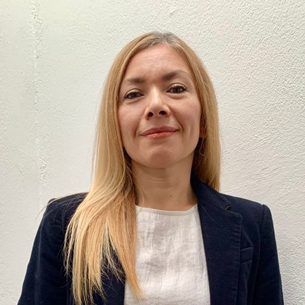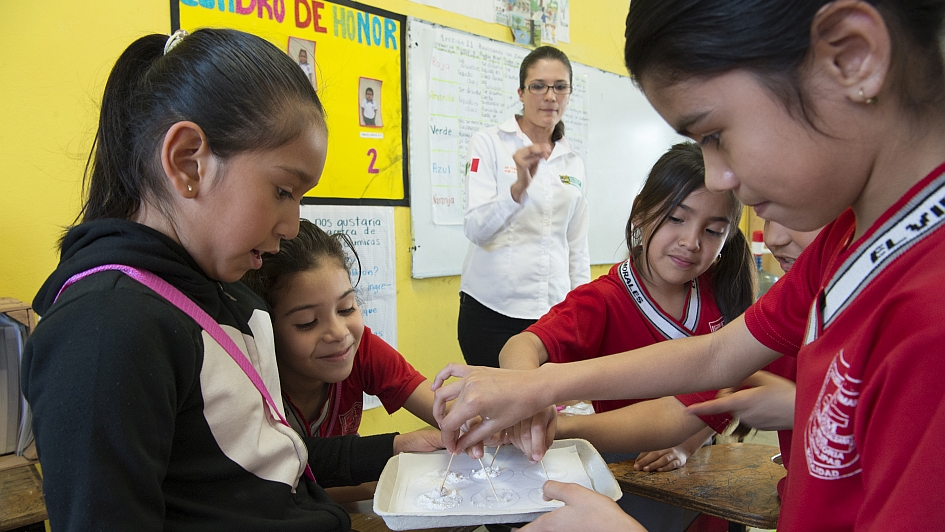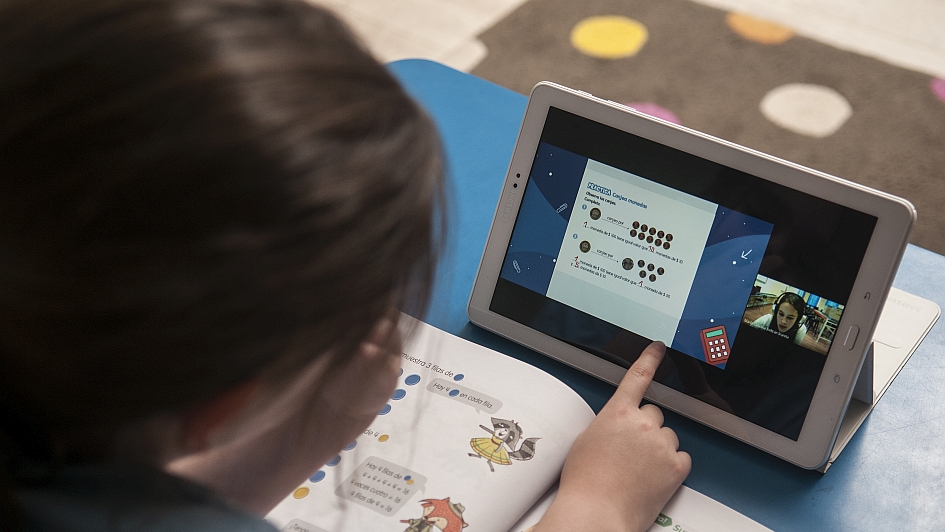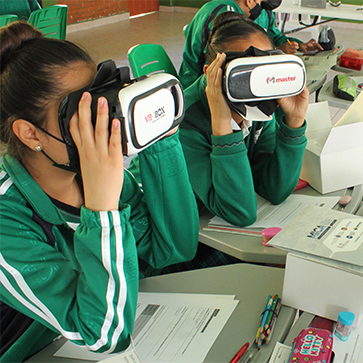Even small teams stick together: creating cohesion through collaboration
Emma Janelle UC Artigas coordinates certification and continuing education for teachers for the state secretary of primary school education within the education ministry of Veracruz, Mexico. During the pandemic, she was in daily contact with teachers who were struggling with isolation, new technological challenges, and connecting with their students in such a trying situation.
»I found it remarkable that even as the teachers dealt with the pandemic’s impact on their own lives, they were mostly focused on how they would continue to teach under the new circumstances.«
Emma Janelle UC Artigas, educational consultant and coordinator for teachers in the Secretariat of State for Elementary Education of the Ministry of Education of Veracruz, Mexico

The COVID 19 pandemic has made the need for digital teaching and learning materials in school lessons undeniable. Figures from UNESCO indicate that some 160 million students in Latin America alone were impacted by school closures. In response to the need for urgent action, Siemens Stiftung joined forces with partner institutions and education ministries in Latin America to launch the STEM Education for Innovation initiative. With financial support from Siemens Caring Hands e. V., the initiative enabled access to innovative educational formats for STEM classes in seven countries. A series of interviews with educators provides a glimpse of how everyday life has changed in kindergartens and schools.
STEM Education for Innovation
Learn about the 14 projects in the Latin American STEM education initiative.
Emma Janelle UC Artigas has supported many teachers since the pandemic began. She heard stories of depression and loneliness, being overwhelmed, but also the unwavering desire to keep teaching. She also learned that platforms like CREA (Centro Recursos Educativos Abiertos), which was created as part of the STEM Education for Innovation education initiative, can provide relief for teachers in the new normal of their daily lives.

The COVID-19 Pandemic
For me, there is a clear divide between my experiences before and after the pandemic. Back then, I organized meetings with teachers, serving as the link between the education secretariat and the teacher training programs. I networked and connected to find seminars, workshops, or events that would best support the professional development of the teachers.
But the impact of the COVID-19 pandemic was clear to me even in the first online meeting with teachers. I was used to working face-to-face every day, and this change was very unsettling for all of us.
The teachers’ initial reactions were varied: Most thought the pandemic would be over quickly. When they realized it would take a while, they became worried and nervous. Many became depressed. Some lost loved ones to the virus. The pandemic had a very significant impact on their lives. Their performance suffered, and the stress took its toll on their health. Many caught the virus themselves, while others faced a difficult situation at home: managing the usual responsibilities of everyday life while continuing to work, all while living in isolation with their families.
Many became depressed. Some lost loved ones to the virus.
Changes in the education system
Our education system was not prepared to deal with this kind of situation. We had to make changes, quite quickly, that addressed the reality faced by the teachers.
Fortunately, some teachers responded well to the challenges presented by new technologies.
This began by familiarizing them with the technology, using tools, apps, and programs to improve lessons. Fortunately, some teachers responded well to the challenges presented by new technologies. But it was a step-by-step process that took time. It did not occur overnight, and it was not the same for everyone.
Not all teachers had access to all technologies, and the same was true for their students.
I found it remarkable that even as the teachers dealt with the pandemic’s impact on their own lives, they were mostly focused on how they would continue to teach under the new circumstances, and how they would continue to reach and support their students. Even in the worst times, they asked: How can I stay in contact with my class? What can we do to make sure everyone can learn in this new environment?
Support
The circumstances showed that it didn’t matter if a person had a PhD or a master’s degree or worked in teaching – everyone was affected. People need help managing challenges that come up at work, especially after work suddenly moved into the home. It is not easy to maintain mental stability in such circumstances. Without a doubt, the thing teachers need the most is emotional support and emotional intelligence for working with their students.
Some felt overwhelmed by all the webinars, resources, and apps.
For most teachers, the main issue wasn’t necessarily teaching materials. In fact, some felt overwhelmed by all the webinars, resources, and apps. More often, the question was: How and when am I going to manage to use all these tools that are available online? The teachers were too exhausted to make choices in a situation that was already difficult enough.

Given the number of tools and education resources that are available online, it is important to have a strategy for collecting these resources and focusing on the ones that are best for primary school education. Organizing these tools and selecting the best content for lessons on a particular topic is needed. Education materials should also be specifically designed for use in school. Simple search and selection processes, and uncomplicated access to the materials, would help teachers achieve their students’ learning objectives.
In this context, the OER platform CREA (Centro Recursos Educativos Abiertos) is a huge help. It saves teachers the time of searching the internet for materials. Instead, CREA provides a wide range of resources and topics for designing lessons. It’s an excellent and practical tool for teachers.
Centro Recursos Educativos Abiertos
CREA gathers a wide range of didactic materials for STEM education.
An ongoing crisis
The pandemic isn’t over – it is still very present. However, a crisis is an opportunity to grow. This year was one of new learnings and new experiences, both in professional and emotional aspects of our lives. Virtual reality provides new opportunities for interacting with teachers and supporting them in these challenging times. All the same, socio-emotional relationships with each other are important, and the personal contact with people and the emotions that are part of daily life at school are certainly missing.
How can we all contribute to increased interaction with each other in such a challenging situation?
How can we work with others to create a sense of responsibility and unity in our society in these new circumstances? How can we all contribute to increased interaction with each other in such a challenging situation? These are questions we face moving forward.
But we have one answer already: In a situation where we are physically isolated, new platforms and networks give us a chance to work collaboratively, get organized, and focus on learning materials. In the end, this helps relieve some of the burden on teachers.
September 2021
STEM Education for Innovation
Together with partners in Argentina, Brazil, Chile, Colombia, Ecuador, Mexico, and Peru, we adapt STEM teaching and learning content for digital use in the classroom. The initiative is supported by Siemens Caring Hands e.V. and the German Federal Foreign Office.



